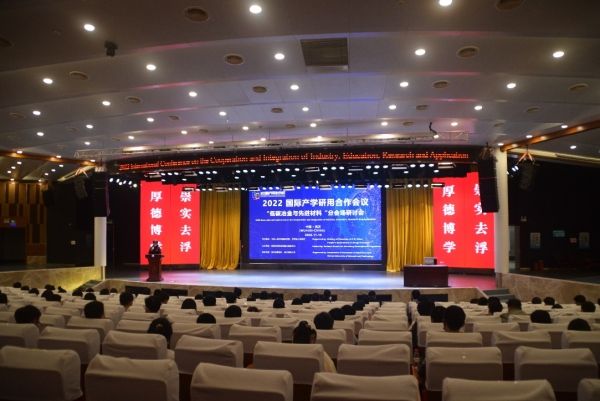Online News of WUST. On November 11, the "Low Carbon Metallurgy and Advanced Materials" Parallel Seminar of 2022 International Conference on the Cooperation and Integration of Industry, Education, Research and Application (the Seminar) was held in Biyuan Auditorium in Qingshan Campus of Wuhan University of Science and Technology (WUST). The Seminar was attended by Huang Nianping, director of the Foreign Exchange and Cooperation Division of the Department of Education of Hubei Province, LV Yong, vice president of WUST, Xiao Qiaoling, director of the Office of International Relations, WUST, She Chunyu, deputy dean of the Office of Scientific Research and Development, WUST, Gu Huazhi, dean of the School of Materials and Metallurgy, WUST, Li Yawei, director of the State Key laboratory of Refractories and Metallurgy, and other leaders. The opening ceremony was presided over by Xiao Qiaoling.

Huang Nianping introduced the purpose of the Ministry of Education (MOE) to initiate the International Conference on the Cooperation and Integration of Industry, Education, Research and Application, and its development history. He pointed out that international cooperation is the fundamental means of solving climate changes, energy crises, and other global issues that no country can just sit by and watch. He wished all countries and regions could work together to enhance the global capability of innovation and integration, build a fair, balanced, inclusive, and sharing international cooperation platform, and create a new community for international technological innovation.
LV Yong welcomed the guests on behalf of WUST and briefed them on the basic information of the school. He hoped that this conference could produce more brainchildren, promote international cooperation in industry, education, research, and application, and help link up the global education chain, talent chain, innovation chain, and industrial chain.
The academic report session of the Seminar was presided over by Ma Guojun, Huang Ao, and Song Shengqiang from WUST. Professor Michel Boussuge from the Ecole des Mines de Paris of France introduced how to break technology bottlenecks with an innovative mindset and school-enterprise cooperation to boost the commercialization of technological outcomes. He took the production, education, research, and application process of casting and smelting high-quality glass with high-zirconium refractories as an example.
Professor Johannes Schenk from the Montanuniversität Leoben of Austria explained in detail about the principle, research progress, and industrial application status of the new steelmaking technology based on smelting reduction with zero-carbon plasma hydrogen. He called on global scientific research institutions and enterprises in the fields to join hands in energy conservation, environmental protection, quality and efficiency improvement of the traditional metallurgical industry.
This Seminar was supported by MOE and the People's Government of Jiangxi, organized by the National Center for Schooling Development Programme (CSDP) under MOE, and co-organized by the Department of Education of Hubei and WUST. Themed on "Low Carbon Metallurgy and Advanced Materials", the Seminar was attended by about 300 experts, scholars, and postgraduate students at home and abroad in both online and offline manners. (Office of International Relations)